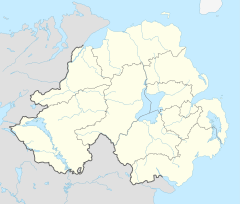Drumquin
Drumquin
|
|
|---|---|
 |
|
| Drumquin shown within Northern Ireland | |
| Population | 291 (2001) |
| Irish grid reference | H329743 |
| • Belfast | 77 miles (124 km) |
| District | |
| County | |
| Country | Northern Ireland |
| Sovereign state | United Kingdom |
| Post town | OMAGH |
| Postcode district | BT78 |
| Dialling code | 028, +44 28 |
| EU Parliament | Northern Ireland |
| UK Parliament | |
| NI Assembly | |
Drumquin (Irish: Droim Caoin (Pleasant ridge).) is a small village and townland (of 398 acres) in County Tyrone, Northern Ireland. It lies between Omagh and Castlederg, on the banks of the Drumquin River (Fairywater). It is situated in the civil parish of Longfield West and the historic barony of Omagh West. It had a population of 291 people in the 2001 Census.
It has a rich and varied historical legacy with a Neolithic stone circle, a Holy Well, and the Giant's Stone on Dooish Mountain. Those who are acquainted with the works of the noted Irish writer Benedict Kiely will be aware of his many references to the Drumquin district, with which he has family connections on his mothers side. In 1802, the countryside around Drumquin was described as one continuous scene of dreary mountains. However, the traveller did point out that forty years before that a rich coalmine had been opened at Drumquin and a canal opened to transport the coal. Drumquin has been in existence since 1211.
Sir John Davies founded the village itself in 1617, and the same gentleman built Castle Curlews, later called Castle Kirlish, the remains of which can be seen in the town land of that name. His agent was a man called Bradley, one of whose family was responsible in later times for the building of the fine stone house, which is a feature of the village today. It is interesting to note that Castle Kirlish was joined to Castlederg Castle by a straight causeway, which was seven miles (11 km) long. Traces of this causeway could still be observed in 1837.
Drumquin was also a stageing town in the 19th and early 20th century for coaches and travellers who were making their way to Derry from Omagh and vice versa. As a result of this the village flourished and hosted a hotel and several shops. Felix Kearney immortalised this area with songs such as "The Hills Above Drumquin" and others. On 26 August 1920, during the Irish War of Independence, the Irish Republican Army (IRA) attacked the Royal Irish Constabulary (RIC) barracks in Drumquin. One RIC constable and one IRA volunteer were killed.
...
Wikipedia

